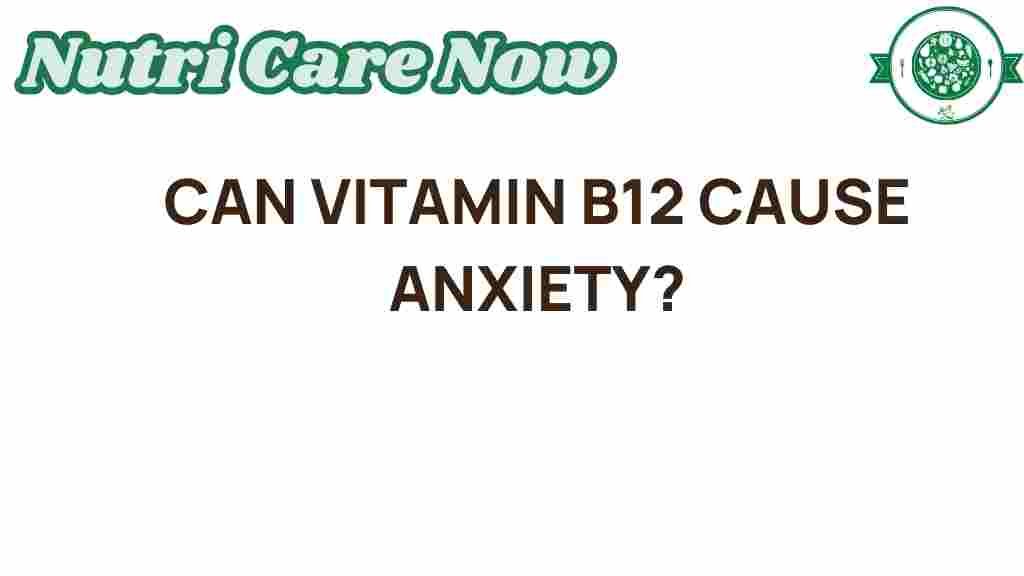The Surprising Connection Between Vitamin B12 and Anxiety
In recent years, the relationship between essential nutrients and mental health has gained significant attention. Among these nutrients, Vitamin B12, often overshadowed by other vitamins, has emerged as a critical player in managing anxiety. Understanding how this vitamin impacts mental health can be vital for those seeking wellness through dietary adjustments and supplements. This article will delve into the connection between Vitamin B12 and anxiety, exploring the importance of this nutrient for overall health and well-being.
What is Vitamin B12?
Vitamin B12, also known as cobalamin, is a water-soluble vitamin that plays a crucial role in various bodily functions. It is essential for:
- Red blood cell formation
- DNA synthesis
- Nerve function
Vitamin B12 is naturally found in animal products such as meat, fish, eggs, and dairy. For those following a vegetarian or vegan diet, it can be challenging to obtain sufficient amounts of this vitamin, leading to potential deficiencies.
The Role of Vitamin B12 in Mental Health
Vitamin B12 is not only vital for physical health but also plays a significant role in mental health. Research suggests that adequate levels of Vitamin B12 are associated with improved mood and cognitive function. The vitamin is involved in the production of neurotransmitters such as serotonin and dopamine, which regulate mood and emotional well-being.
A deficiency in Vitamin B12 can lead to various mental health issues, including:
- Depression
- Anxiety
- Cognitive decline
Understanding this connection is crucial for individuals struggling with anxiety, as improving Vitamin B12 levels may help alleviate symptoms.
How Vitamin B12 Deficiency Contributes to Anxiety
Vitamin B12 deficiency can contribute to anxiety in several ways:
- Nerve Health: Vitamin B12 is important for maintaining healthy nerve cells. A deficiency can lead to nerve damage, which may manifest as anxiety symptoms.
- Hormonal Balance: The vitamin plays a role in the synthesis of neurotransmitters that regulate mood. Low levels can disrupt this balance, leading to increased anxiety.
- Energy Levels: A deficiency in Vitamin B12 can cause fatigue and weakness, making it difficult to cope with stress, ultimately leading to heightened anxiety.
Signs of Vitamin B12 Deficiency
Recognizing the signs of Vitamin B12 deficiency is crucial for addressing potential health issues, including anxiety. Common symptoms include:
- Fatigue and weakness
- Pale or jaundiced skin
- Nerve problems like tingling and numbness
- Balance difficulties
- Memory loss and cognitive difficulties
- Mood changes, including anxiety and depression
How to Increase Vitamin B12 Intake
If you’re concerned about Vitamin B12 levels and their impact on anxiety, there are several ways to increase your intake:
- Dietary Sources: Include more Vitamin B12-rich foods in your diet. Good sources include:
- Meat (especially liver)
- Fish (such as salmon and tuna)
- Dairy products (milk, cheese, yogurt)
- Eggs
- Fortified Foods: Many plant-based foods, such as cereals and plant milks, are fortified with Vitamin B12.
- Dietary Supplements: If dietary sources are insufficient, consider Vitamin B12 supplements. They come in various forms, including tablets, capsules, and injections. Consult a healthcare professional to determine the right option for you.
Step-by-Step Process to Optimize Vitamin B12 Levels
If you’re looking to optimize your Vitamin B12 levels for better anxiety management, follow these steps:
- Assess Your Diet: Take a close look at your daily food intake. Are you consuming enough Vitamin B12-rich foods?
- Consider Your Lifestyle: If you’re vegetarian or vegan, think about fortified foods or supplements to meet your B12 needs.
- Get Tested: If you suspect a deficiency, ask your doctor for a Vitamin B12 blood test to assess your levels.
- Consult a Professional: Based on your test results, discuss with your healthcare provider whether you need dietary changes or supplements.
- Monitor Your Symptoms: Keep track of any changes in your anxiety levels as you adjust your Vitamin B12 intake.
Troubleshooting Tips for Maintaining Adequate Vitamin B12 Levels
If you experience challenges in maintaining adequate Vitamin B12 levels, consider these troubleshooting tips:
- Regular Monitoring: Schedule regular check-ups to monitor your Vitamin B12 levels, especially if you follow a restricted diet.
- Educate Yourself: Learn about foods high in Vitamin B12 and incorporate them into your meals.
- Choose Quality Supplements: If using supplements, opt for high-quality brands and forms that are easily absorbed by the body.
- Address Absorption Issues: If you have conditions that affect absorption (like celiac disease or Crohn’s disease), work with your healthcare provider to manage these conditions.
Conclusion
The connection between Vitamin B12 and anxiety is both fascinating and crucial for mental health wellness. As we have explored, Vitamin B12 plays a significant role in maintaining nerve health, hormonal balance, and overall energy levels, all of which can impact anxiety. Recognizing the signs of deficiency and taking proactive steps to increase your Vitamin B12 intake can lead to improved mental health and a reduction in anxiety symptoms.
For those looking to enhance their health through vitamins and dietary supplements, focusing on Vitamin B12 is a wise choice. Remember, always consult with a healthcare professional before making significant changes to your diet or supplementation routine. By prioritizing this essential nutrient, you can support not only your physical health but also your mental well-being.
For more information on vitamins and their impact on health, check out this resource. And if you want to learn more about mental health, visit this website for helpful insights.
This article is in the category Health and created by NutriCareNow Team

2 thoughts on “The Surprising Connection Between Vitamin B12 and Anxiety”